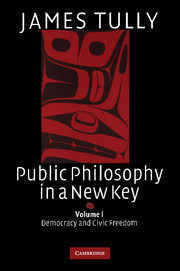Book contents
- Frontmatter
- Contents
- Acknowledgments
- Credits
- INTRODUCTION
- PART 1 APPROACHING PRACTICE
- 1 Public philosophy as a critical activity
- 2 Situated creatively: Wittgenstein and political philosophy
- 3 To think and act differently: comparing critical ethos and critical theory
- PART 2 DEMOCRACY AND RECOGNITION
- PART 3 INDIGENOUS PEOPLES
- CONCLUSION
- Bibliography
- Index to Volume I
- IDEAS IN CONTEXT
1 - Public philosophy as a critical activity
Published online by Cambridge University Press: 05 September 2012
- Frontmatter
- Contents
- Acknowledgments
- Credits
- INTRODUCTION
- PART 1 APPROACHING PRACTICE
- 1 Public philosophy as a critical activity
- 2 Situated creatively: Wittgenstein and political philosophy
- 3 To think and act differently: comparing critical ethos and critical theory
- PART 2 DEMOCRACY AND RECOGNITION
- PART 3 INDIGENOUS PEOPLES
- CONCLUSION
- Bibliography
- Index to Volume I
- IDEAS IN CONTEXT
Summary
INTRODUCTION
This chapter was first written for a special edition of the journal Political Theory, in which the editors asked the contributors to respond to the question, ‘What is political theory?’ This question is as old as political theory or political philosophy. The activity of studying politics, whether it is called science, theory or philosophy, always brings itself into question. The question does not ask for a single answer, for there are countless ways of studying politics and no universal criteria for adjudicating among them. Rather, the question asks, ‘What comparative difference does it make to study politics this way rather than that?’ Political theory or philosophy spans not only three millennia of studying politics in innumerable ways but also three millennia of dialogues among practitioners over various approaches, their relative merits and the contestable criteria for their comparison. Because there is no definitive answer there is no end to this dialogue. Rather, it is the kind of open-ended dialogue that brings insight through the activity of reciprocal elucidation itself. Dialogue partners gain insight into what ruling, being ruled and contesting rule is through the exchange of questions and answers over different ways of studying politics and over different criteria for their assessment relative to how they illuminate different aspects of the complex worlds of politics. And what counts as the ‘different aspects of the complex worlds of politics’ is also questioned in the course of the dialogue.
- Type
- Chapter
- Information
- Public Philosophy in a New Key , pp. 15 - 38Publisher: Cambridge University PressPrint publication year: 2008
- 1
- Cited by

